When author Max Gladstone first read Updraft, he contacted me, saying “You know, there’s no magic in your book, only engineering.”
He had no idea how much I was going to use that phrase. I think I owe him lunch or something.
But he was exactly right, except that he was also wrong. There IS magic in the Bone Universe series—all the way through from Updraft to Horizon. And—from the bridges to the wings and more, to the understanding of the wind around the towers—the magic is all engineering.
I’ve written elsewhere about how engineering is the invisible science in science fiction. Tor.com this summer hosted a roundtable on engineering and SF that was a lot of fun and filled with gears and magic.
And here are five books—fiction and non—that bring engineering’s magic to life on the page:
The Goblin Emperor by Katherine Addison
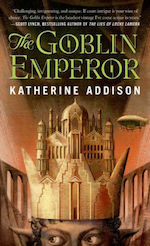 The clock. The city maps. The bridges. The planning meetings. The looming trainwreck of bureaucracy versus schematics. Oh THIS BOOK, I want to build it all. Winner of the Locus Award for Best Fantasy Novel and finalist for the Nebula, Hugo, and World Fantasy Awards, The Goblin Emperor chronicles half-elf, half-goblin Maia’s entrance into a long standing Byzantine power structure, and all the diplomatic and social tensions that entails. Meantime, the very structure of the city, and the works therein capture Maia’s attention, and mine, every time.
The clock. The city maps. The bridges. The planning meetings. The looming trainwreck of bureaucracy versus schematics. Oh THIS BOOK, I want to build it all. Winner of the Locus Award for Best Fantasy Novel and finalist for the Nebula, Hugo, and World Fantasy Awards, The Goblin Emperor chronicles half-elf, half-goblin Maia’s entrance into a long standing Byzantine power structure, and all the diplomatic and social tensions that entails. Meantime, the very structure of the city, and the works therein capture Maia’s attention, and mine, every time.
The Broken Earth Series by N.K. Jemisin
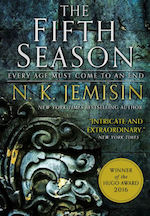 In N.K. Jemisin’s Broken Earth series, the power to break as well as build the continent called the Stillness belongs to the orogenes and the Guardians who control them. The geo-engineering and seismology in the books makes this series a favorite go-to for a layer of reasons, not the least of which is that when there’s a quake on land, a boat at sea reacts exactly as it should … all details engineers will love.
In N.K. Jemisin’s Broken Earth series, the power to break as well as build the continent called the Stillness belongs to the orogenes and the Guardians who control them. The geo-engineering and seismology in the books makes this series a favorite go-to for a layer of reasons, not the least of which is that when there’s a quake on land, a boat at sea reacts exactly as it should … all details engineers will love.
The Dandelion Empire by Ken Liu
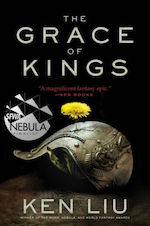 From the manned kites of Grace of Kings to the bureaucratic negotiations, the engineering states of iteration and failure, all the way to the incredible machines of Wall of Storms, Ken Liu’s care with engineering’s successes and fail states is a winning combination. Using historical research dating back to the Tang Dynasty, Liu puts engineering on the page and brings it to life.
From the manned kites of Grace of Kings to the bureaucratic negotiations, the engineering states of iteration and failure, all the way to the incredible machines of Wall of Storms, Ken Liu’s care with engineering’s successes and fail states is a winning combination. Using historical research dating back to the Tang Dynasty, Liu puts engineering on the page and brings it to life.
The Soul of a New Machine by Tracy Kidder
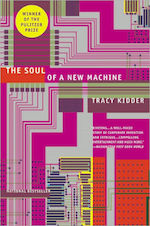 In 1980, a race against time and between competing engineering teams pit two companies against each other. At stake, the building of the next-generation microcomputer: the ancestor of the personal computer, a new commonplace item. The Soul of a New Machine documents that race, and won the National Book Award and the Pulitzer Prize by chronicling the personal lives of the engineers—including college students who had never worked in production lines—as they took risks, cut corners, and thought beyond what they knew to beat the clock. It’s part of our technical history that reads a bit like science fiction. And it’s still a wonderful, if dated, book.
In 1980, a race against time and between competing engineering teams pit two companies against each other. At stake, the building of the next-generation microcomputer: the ancestor of the personal computer, a new commonplace item. The Soul of a New Machine documents that race, and won the National Book Award and the Pulitzer Prize by chronicling the personal lives of the engineers—including college students who had never worked in production lines—as they took risks, cut corners, and thought beyond what they knew to beat the clock. It’s part of our technical history that reads a bit like science fiction. And it’s still a wonderful, if dated, book.
The Great Bridge by David McCullough
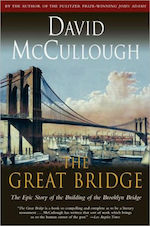 This story of the Brooklyn Bridge is where I first learned about the bends, about caissons, and steel cabling.(Not for lack of trying by the engineers in my family who talked about these things at dinner all the time, honest). McCullough’s history of the Bridge was also the history of the Roebling family, and Emily Roebling especially—and this trumped dinner conversation any day. The bridge walk in Updraft was inspired by the fact that Emily Roebling crossed the Brooklyn Bridge alone, first, to prove it was safe. A modern classic about bridges and engineering, a copy of this book has traveled with me for every major move since college.
This story of the Brooklyn Bridge is where I first learned about the bends, about caissons, and steel cabling.(Not for lack of trying by the engineers in my family who talked about these things at dinner all the time, honest). McCullough’s history of the Bridge was also the history of the Roebling family, and Emily Roebling especially—and this trumped dinner conversation any day. The bridge walk in Updraft was inspired by the fact that Emily Roebling crossed the Brooklyn Bridge alone, first, to prove it was safe. A modern classic about bridges and engineering, a copy of this book has traveled with me for every major move since college.
… also, for those looking for shorter fiction, check out: Kij Johnson’s “The Man Who Bridged the Mist” and John Chu’s “The Sentry Branch Predictor Spec: A Fairy Tale” !
 Fran Wilde’s trilogy, The Bone Universe Series, comes to a close this fall with Horizon joining the award-winning debut novel, Updraft (Tor 2015) and Cloudbound (2016). Her novels and short stories have been nominated for two Nebula awards and a Hugo, and appear in Asimov’s, Tor.com, Beneath Ceaseless Skies, Shimmer, Nature, and the 2017 Year’s Best Dark Fantasy and Horror. She writes for publications including The Washington Post, Tor.com, Clarkesworld, iO9.com, and GeekMom.com. You can find her on Twitter, Facebook, and at franwilde.net.
Fran Wilde’s trilogy, The Bone Universe Series, comes to a close this fall with Horizon joining the award-winning debut novel, Updraft (Tor 2015) and Cloudbound (2016). Her novels and short stories have been nominated for two Nebula awards and a Hugo, and appear in Asimov’s, Tor.com, Beneath Ceaseless Skies, Shimmer, Nature, and the 2017 Year’s Best Dark Fantasy and Horror. She writes for publications including The Washington Post, Tor.com, Clarkesworld, iO9.com, and GeekMom.com. You can find her on Twitter, Facebook, and at franwilde.net.










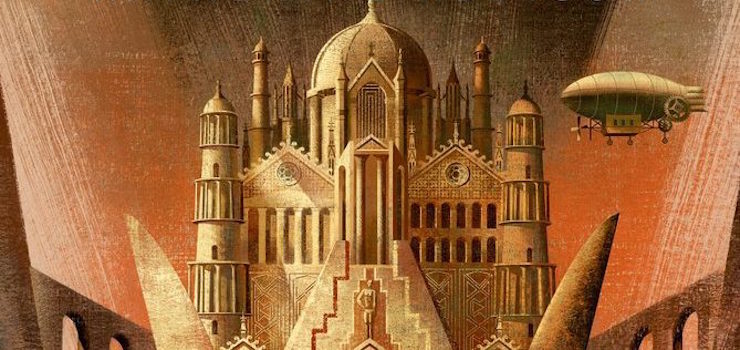
Omitting K J Parker’s Engineer trilogy?
So this is the article that features the mechanics from The Goblin Emperor? Nice :) A wonderful book.
Also see John Chu’s cool “Hold Time Violations,” https://www.goodreads.com/review/show/1517681176
And in Ken McLeod’s great Learning the World: A Scientific Romance, the Alien Space Bats enjoy reading Engineering Fiction, https://www.goodreads.com/review/show/476330135
Also features young Atomic Discourse Gale’s amusing shipnet blog….
I wonder how many engineers have become engineers because of books like these!
I would add also: The Martian by Andy Weir, The Difference Engine by Bruce Stirling and William Gibson, The Quintaglio triligy by Robert Sawyer.
By nature most of these books are borderline engineering and science, but this in my view is not a disadvantage.
An off-the-wall recommendation in this category from the depths of obscura: “A Spell of Empire” by Michael Scott Rohan and Allan J. Scott features the impressive kobold canal works capable of lifting sailing ships over a mountain range, with detailed imagery I’ve never forgotten. Great place for a fight scene, too.
“I am moving to a commune in Vermont, where I will contemplate no unit of Time shorter than a season.”
Got a first edition of that book. It was based on a pair of articles in The Atlantic, “Flying Upside Down”.
There is some pretty crazy fantasy engineering in China Mieville’s Perdido Street Station.
All of the Honor Harrington books. Lots of good technical ship and missile tech talk. .
These are great book suggestions – thank you all so much!
David Brin’s The Practice Effect?
The Cross Time Engineer
Put the collection of short stories by Colin Kapp, “Unorthodox Engineers” and his novel “Survival Game” on your lists
Falling Free by Lois McMaster Bujold. The main character, an engineer, has to engineer his way out of several plot points.
Great list – I’ve read 3 of the 5 and absolutely loved them. It was neat to see Tracy Kidder’s book here; it’s been years since I read it but I remember really enjoying it, even though by the time I got around to reading it the the technology in it had been deemed obsolescent by new developments. The Ken Liu & David McCullough books are both on my to-be-read list, and now I’m really looking forward to them.
I’m surprised that no one has mentioned the Ringworld books by Larry Niven.
Seveneves by Stephenson seems like an oversight.
I suspect that Kim Stanley Robinson is the grandfather of engineering fiction, or at the very least the uncle – even if you only look at his Mars Trilogy, it’s all about different sorts of engineering from mechanical to biological, to trying to engineer a society and a whole world.
In a slightly (well, more than slightly) non-serious vein: The Trans-Atlantic Tunnel, by Harry Harrison.
In a very serious vein, I suggest Neville Shute Norway’s autobiography, Slide Rule and John McPhee’s Deltoid Pumpkin Seed
Actual engineer here.
Involved in building satellites and ground station development, as well as software development. UNSW mechatronics grad.
Engineering itself is not a discipline that is generally amenable to the processes of story telling fiction. There are generally no crises to avert except when things go really wrong. Problems are presented, and are solved as a group, usually in a multidisciplinary way. Solutions go through interminable rounds of stakeholder review. There’s also no escaping the laws of physics and maths, but finding new ways to use them can be fun. Engineers working in isolation is a misrepresentation. I’ve never the seen the joy of math (50% engineering) communicated well in any fictional or story-type book I’ve ever read, but this is probably just due to the fact that I haven’t come across the right book. Curiously I have seen it communicated well in a movie – Agora. In that movie a mathematician devoted the latter part of her life to working out a mathematical relationship and I thought it was portrayed well. I look forwards to the seminal ‘SF engineering’ book one day…
It’s not the central focus of the books, but I feel that Rothfuss deserves a mention here for the artificing in The Kingkiller Chronicles. He does an excellent job of combining engineering with his magic system of sympathy (which is itself based on rules analogous to the laws of thermodynamics) to create something that is both magical and logical.
Rothfuss mentioned in a talk that he tries to add lots of different things to his books so that you can find something you love no matter what kind of geek you are (music, language, engineering, etc) and, at least for this engineer, he succeeded.
Nitpick – The Soul of a New Machine is about the development of a next generation minicomputer, not microcomputer, which (initially) was differentiated from future microcomputers by having a CPU built up from multiple transistors or discrete logic chips instead of being on a single chip.
Great book btw, though I prefer Dealers of Lightning (about Xerox PARC and all they pioneered).